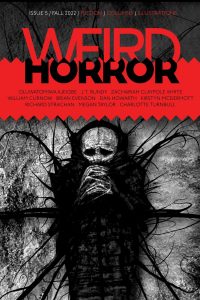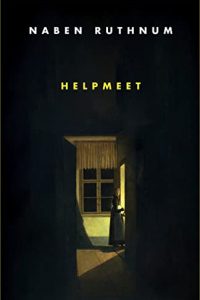Charles Payseur Reviews Short Fiction: Kaleidotrope, Diabolical Plots, and F&SF
 Kaleidotrope 10/22
Kaleidotrope 10/22
Diabolical Plots 10/22
F&SF 11-12/22
Kaleidotrope’s October issue is positively bursting with flash fiction – twenty stories in all. The focus on shorter works gives the issue a breadth of ideas while allowing readers to move quickly from piece to piece, from world to world. It’s a speculative smorgasbord mixing fantasy, science fiction, and horror of all stripes and flavors. Ziggy Schutz provides a story of fae and dreams in “Just North of True”, which finds a will-o-the-wisp named Secret yearning for the winter court and its cold, hot ruler. It’s a desire that they share, and because it’s real and powerful, captivating and enchanting, it might just break the rules of the fae, or blur them enough to make the summer colder and give Secret a chance to be seen, believed, and accepted. Schutz does lovely work in capturing the magic of stories through a playful complication of truth and lies. Taemumu Richardson’s “Cry Wolf” finds a wolf, an ex-con, living in a place with next to nothing, though that doesn’t stop people from trying to take even that away from him. The work plays out like a fairy tale where the big bad wolf has been humbled, hobbled, and made to live in a subdivision with pigs who want to see him suffer. It’s an uncomfortable and grim story, and Richardson doesn’t pull any punches in bringing this wolf to the only place fairy tales allow wolves.
The issue shifts from fantasy to science fiction with M.J. Pettit’s “A Glossary of Psychological Terms Useful for People Trying to Change their Past”, where a time traveler wants to change themself by changing their father by making small suggestions to make certain choices more attractive. Through Pettit’s framing of the story as an actual glossary, though, the structure of the work makes the plot itself subtle; a line of implication showing that time travel, like psychology, isn’t an exact science. It’s an innovative story that rewards a careful reading. Louis Evans keeps things science fictional but tells a much more visceral story of prejudice and violence in “Captcha Tomorrow”. If you’ve ever felt the “prove you’re not a robot” Captchas for forms might be a little mean-spirited toward robots, Evans imagines a future where, with advances in AI, the reality is even more grim, as Captchas have been built into everything from park benches to businesses. With confident worldbuilding, the story finds an artificial person who can get around most of these simple Captchas but finds that no amount of passing – no amount of seeming human – is a protection against prejudice and the violence so often tied to it. And finally, G.C. Baccaris closes out the issue with the fairy-tale flavored “Vows Writ in Scrimshaw”, which centers royal siblings as different as night and day, as land and sea. For all their differences, though, they are close, connected, and the story follows as they grow, change, and begin to drift apart. But there are common waters running through them, and I appreciate the way Baccaris captures the bond between the siblings with care and skill. Mesmer, the daughter – bold and decisive, in love with the sea, and Enoch, the son – quiet and patient, comfortable only on land. There are traps out there for both of them, but by helping each other, they might just be able to escape them and find a freedom they’ve always dreamed of.
In case you hadn’t had October chills, Diabolical Plots also kept things spooky with a pair of stories centered on magic and death. The two works are very different, though, and while Amy Johnson’s “Estelle and the Cabbage’s First Last Night Together” leans heavily into witches and a backstory full of grisly violence, the story itself is a slow and tender look at the joy of life and good eating. It finds Estelle, who has learned the secrets of life from a fungus, heading out to find a cabbage to possibly bring into her home. She awakens the cabbage and asks it to live on through cycle after cycle of growth and reaping, all with a knowledge and respect from the woman who will be making them into different delicious meals. While she’s trying to recruit this cabbage, she would never force them, and makes sure that they would also be accepted by the other food plants living under her care already. I can honestly say I’ve never read anything quite like it, and Johnson provides a moving and memorable experience.
Moving out of October, the November/December F&SF is filled with stories that challenge, entice, and delight. Louis Evans makes his F&SF debut with “Though the Heavens Fall”, which introduces the legendary mind ship Carmine, who has become a cosmic judge for ships caught inside the Protocol, a trade-based meeting in which no joined ship can enter or leave without the consent of all parties. When the stakes of a disagreement can be complete destruction for all parties, judges must be careful and certain, and Carmine is fueled by a sense of justice that is sorely needed for two ships trapped over a perceived sanctuary request. Evans provides a tricky ethical dilemma and navigates it with confidence and style, finding in Carmine a perspective ancient and wise, but no less relatable, no less human (for all they’re an alien AI as well). Vida Cruz-Borja also makes a F&SF debut with “Child of Two Worlds”, a story about Adelfa, a girl raised between two worlds, with two magical guardians who want vastly different things for her. Caught between those two desires, it’s almost a surprise when she discovers that the choice between the futures laid out before her is a false one, ignoring all the wide world that her guardians haven’t allowed her to really see or experience. As the time to choose what to do with her life nears, though, the introduction of a bumbling cartographer named Mateo complicates an already tense situation, spilling out into magical kidnapping and challenges designed to force her down a specific road. Cruz-Borja tells a coming-of-age story about destiny and family amidst rich descriptions of the only homes Adelfa has known, and the world opening up just outside her reach. J.C. Hsyu joins those making their F&SF debuts this month with the punkish ‘‘Optimist Cleaver’s Last Transmission’’. Optimist Cleaver is a courier with a perfect record, at least until she gets distracted by finally tracking down the last remains of her adopted father, who also ran a criminal syndicate she inherited over her older ‘‘little brother.’’ It’s the same syndicate she gave up for a life of more freedom and less bloodshed, only for that same ‘‘little brother’’ to track her down to bury the hatchet – preferably in her. Hsyu mixes action, grit, and a wry sense of humor in this pulse-pounding story of motorbike battles, betrayals, and cutting-edge technology. The result is at times grisly but always entertaining, with characters that pop and an almost cinematic style that dazzles.
To avoid sounding like a broken record, I’ll say here that the next two poets also make their debut at the publication, which really does show the editor’s dedication to getting authors new to F&SF into the hands of its readers. Shelly Jones melds the natural and the human, or perhaps perceives the human as natural, in ‘‘Familiar’’. In it, a witch communes with the world, asserts her place in it and embraces it, seeing through its eyes, listening to its voices, and finding its presence anything but lonely. Cut off from other humans she might be, but even in that relative isolation she is still a part of something huge, old, and comforting, and the poem lingers on the beauty and power of the buzz of a bee, the stretch of a vine. Jay Sturner has two poems in the issue, both also dealing with the lines between human and nature, with ‘‘Final Gathering’’ looking at the sobering impact of human’s exploitation of the environment on its magical inhabitants, and ‘‘From Below’’ showing that same magical and natural world finding a way to fight back. The works deal with the loss of a sense of wonder and community between humans and the larger world, and shows the lack of balance being resolved in the way that humanity dictated – with violence and death and a slow unstoppable creep. Together, the poems make an effective warning that humans should be careful, lest we be treated as we’ve treated others, including the world that sustains us.
Recommended Stories:
“Cry Wolf”, Taemumu Richardson (Kaleidotrope 10/22)
“Optimist Cleaver’s Last Transmission”, J.C. Hsyu (F&SF 11-12/22)
This review and more like it in the December 2022 issue of Locus.
 While you are here, please take a moment to support Locus with a one-time or recurring donation. We rely on reader donations to keep the magazine and site going, and would like to keep the site paywall free, but WE NEED YOUR FINANCIAL SUPPORT to continue quality coverage of the science fiction and fantasy field.
While you are here, please take a moment to support Locus with a one-time or recurring donation. We rely on reader donations to keep the magazine and site going, and would like to keep the site paywall free, but WE NEED YOUR FINANCIAL SUPPORT to continue quality coverage of the science fiction and fantasy field.
©Locus Magazine. Copyrighted material may not be republished without permission of LSFF.







